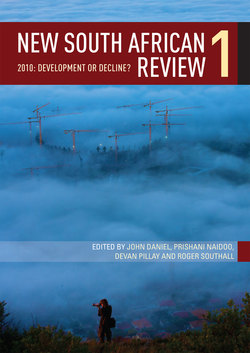Читать книгу New South African Review 1 - Anthony Butler - Страница 37
На сайте Литреса книга снята с продажи.
THE 2010 FIFA WORLD CUP: Projections, Preparations and Prospects
ОглавлениеSouth Africa’s hosting of the 2010 FIFA World Cup should be understood within the emergent international political economy of sport mega-events and in terms of the relationship between sport and politics in the country in the post-apartheid era. As suggested, there has been the stronger commercialisation of large-scale sports events over the years, which in turn helped place an economic premium on the hosting of such events for national and urban governments across the world. Against this background, it is useful to regard South Africa’s hosting of the World Cup as the culmination of an extended strategy by the government to use sports events to position the country more prominently in the international arena. This was mostly aimed at drawing foreign direct investment and enhancing the country’s status as a tourist destination. Indeed, since the end of apartheid, South Africa had bid for a significant number of high profile sports events. In 1992 the city of Cape Town put in a bid to host the 2004 Olympic Games. The city failed in its Olympic bid, but there has been speculation that another South African city, Durban, may bid for the 2020 Games. In 1995, South Africa hosted the Rugby World Cup and in 1996 the country provided the venue for the biennial continental football championship, known as the Africa Cup of Nations. Then, in 1999, South Africa hosted the All Africa Games and two further world championships in 2003 – the International Cricket Council’s World Cup, and the Women’s World Cup of Golf. However, securing the rights to host the 2010 FIFA World Cup was a particular victory for South Africa’s bid campaigners, since this presented a unique opportunity to showcase the country on the world stage (for reviews see Cornelissen and Swart 2006).
But the pursuit to host sports events has also been underpinned by a second rationale on the part of South Africa’s leaders, which relates to the powerful connection which has historically existed between sport and politics in the country and the role that sport plays in the socio-cultural imaginary. Since the political symbolism that has surrounded the Springboks’ victory of the 1995 Rugby World Cup, sport has gained significance as a means of helping to overcome racial differences and as a vehicle for redress in the post-apartheid era. This has been a strong and consistent element of the government’s pronouncements on the 2010 World Cup. As an illustration, Makhenkesi Stofile, the minister of sport stated that:
(T)he awarding of the 2010 World Cup host to South Africa by FIFA is a legacy on its own. For South Africa and the rest of Africa, the memory of that tournament will be a lasting legacy. But we cannot end there ... (We) believe that preparations for the 2010 World Cup must leverage the fast-tracking of some elements of our transformation agenda ... (We) must use this opportunity to level the proverbial playing grounds, both in respect of infrastructure and otherwise (Stofile 2007).
